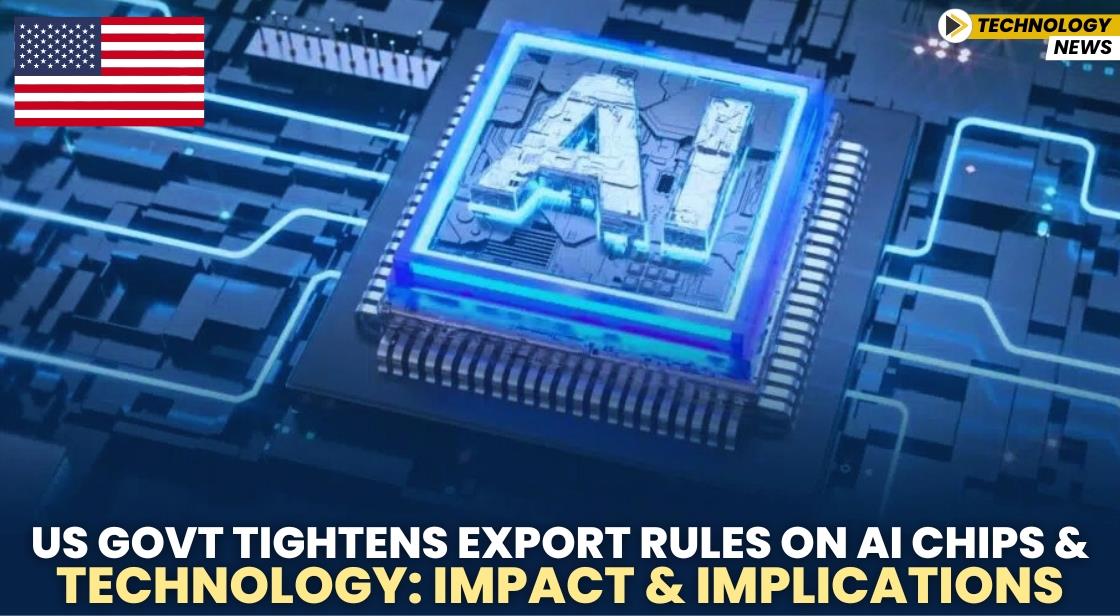US Govt Tightens Export Rules on AI Chips and Technology: Impact and Implications

News Synopsis
The United States government announced on Monday its decision to strengthen restrictions on the export of artificial intelligence (AI) chips and related technologies. This initiative aims to retain the country’s dominance in AI development and chip design while limiting access to adversarial nations like China, Russia, Iran, and North Korea.
United States New Restrictions on AI Exports
Under the updated regulations, the U.S. will:
-
Cap the export of AI chips to most countries.
-
Allow unlimited access to U.S. AI technology for its closest allies, including countries like Japan, Britain, and South Korea.
-
Maintain stringent restrictions on adversarial nations, particularly China, to curb their access to advanced computing power.
The regulations come as part of the Biden administration's ongoing efforts to bolster the United States' position in the global AI race. Commerce Secretary Gina Raimondo emphasized the importance of these measures, stating, “The US leads AI now - both AI development and AI chip design, and it’s critical that we keep it that way.”
Mission to Safeguard AI Leadership
The initiative marks the culmination of a four-year strategy by the Biden administration aimed at limiting China’s ability to acquire advanced chips that could bolster its military capabilities. By closing existing loopholes and implementing additional safeguards, the U.S. seeks to ensure long-term global dominance in AI technology.
The Role of AI Chips in Global Development
The regulations specifically target advanced graphics processing units (GPUs), crucial for training AI models in data centers. Major players in the AI chip industry, including Nvidia and Advanced Micro Devices (AMD), have expressed concerns over the new rules. Nvidia referred to the move as “sweeping overreach,” citing the potential impact on the global market for AI hardware.
Cloud Service Providers: New Rules, New Opportunities
Leading cloud service providers like Microsoft, Google, and Amazon Web Services can apply for global authorizations to set up data centers. Once approved, these companies will not require export licenses for AI chips in certain regions. However, stringent conditions such as security compliance, reporting standards, and human rights adherence will be mandatory.
The regulation also places limitations on the use of computing power outside the U.S.:
-
A maximum of 50% of computing power can be deployed outside the U.S.
-
Only 25% can be allocated outside Tier 1 countries.
-
No more than 7% can be deployed in a single non-Tier 1 country.
Global and Industry Response
The decision has sparked mixed reactions globally:
-
China’s Commerce Ministry condemned the rules, pledging to protect its “legitimate rights and interests.”
-
Oracle and other data center providers warned that these restrictions might inadvertently strengthen Chinese competitors in the global AI and GPU markets.
Broader Implications of AI Regulations
AI’s dual-use potential adds complexity to these export restrictions. While AI advancements promise to revolutionize sectors like healthcare and education, they also raise concerns about misuse in developing biological weapons, surveillance, and cyberattacks.
U.S. National Security Adviser Jake Sullivan underscored the urgency of these measures, stating, “The US has to be prepared for rapid increases in AI's capability in the coming years, which could have a transformative impact on the economy and on our national security.”
Conclusion
The United States' tightened regulations on AI chip and technology exports underscore the nation’s commitment to maintaining its leadership in artificial intelligence. By implementing tiered restrictions and reinforcing alliances with trusted partners, the U.S. aims to protect its technological edge and national security.
However, the ripple effects of these measures are being felt globally, with criticism from industry leaders like Nvidia and concerns from international stakeholders about potential market imbalances.
While the regulations promise to curb adversarial access to advanced AI capabilities, they also highlight the delicate balance between innovation and control. As AI continues to revolutionize industries, its potential for misuse necessitates stringent oversight.
The next decade will be critical in determining the success of these measures in safeguarding U.S. interests while fostering ethical global AI development. With a robust framework in place, the U.S. stands poised to navigate the challenges and opportunities of this transformative technology.
You May Like









